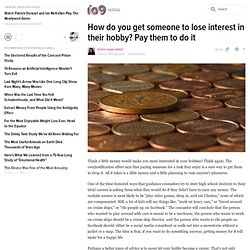

Charles Eisenstein: 'In a gift economy the more you give, the richer you are' - video. 104.02.GiveTake. The New Science of Giving. LIKE ANY POPULAR food writer, Gary Taubes gets more than his share of e-mails about his work.
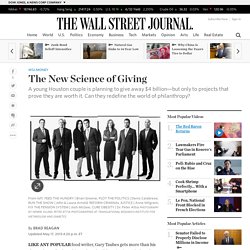
So he didn't give it much thought one day two years ago when he got a five-line comment about a podcast he'd given the week before. It was plainly signed "John. " The man was intrigued by Taubes's theories on why people get fat—more specifically, the food writer's argument that most of the science on obesity is either badly flawed or inconclusive. What was needed, Taubes had said, was a comprehensive experiment that can answer some of the key questions about how our bodies process food. The problem is that such a study is hugely expensive. Taubes noticed that the full name in the email was John Arnold, and a quick Google search turned up a curious figure under that name: a wunderkind natural-gas trader at Enron who later founded his own hedge fund. Taubes passed the name onto Peter Attia, a medical doctor with whom he had recently founded a nonprofit focused on nutrition science.
J. What If Money Was No Object [Video] Forward the (R)evolution - in Harmony with the Earth. NPO Connect. NPO Connect: Not just a skill sharing tool, but an important proof of concept. Welcome to the Gifting Earth. Using Tribes to Enable Sharing Within Offline Networks. Neal Gorenflo wrote a thoughtful post on the issues related to neighborhood stuff sharing.
In the post he noted that while there are a huge number of sharing sites out there, so far none of them has managed to gain significant traction. In the end of the post he offered some suggestions on how to get neighbors to share their stuff. One of the suggestions, "Sharing Meets Community Organizing", really struck a chord. I believe the answer is to empower the offline networks we already have - whether they are our neighbors, fellow students or colleagues at work. We need to give people tools to share within these networks, and the community organizers the tools to facilitate this sharing. - The Gleaners' Kitchen. The Gift (book) Mauss's original piece was entitled Essai sur le don.
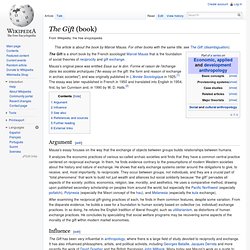
Forme et raison de l'échange dans les sociétés archaïques ("An essay on the gift: the form and reason of exchange in archaic societies") and was originally published in L'Année Sociologique in 1925.[1] The essay was later republished in French in 1950 and translated into English in 1954, first, by Ian Cunnison and, in 1990 by W. D. Halls.[2] Marcel Mauss. Background[edit] In These Times - Give It Away. Give It Away By David Graeber.
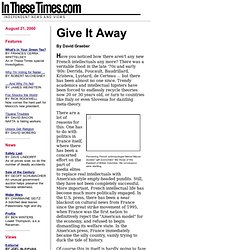
The Resource Based Economy. Thisisimpossible. Sacred Economics Monetary Solutions. Conscious Capitalism. In the words of Darden school of management professor and Conscious Capitalism, Inc trustee Ed Freeman, “We need red blood cells to live (the same way a business needs profits to live), but the purpose of life is more than to make red blood cells (the same way the purpose of business is more than simply to generate profits).”
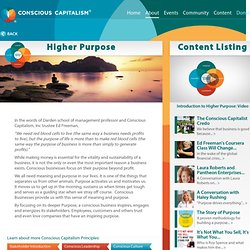
While making money is essential for the vitality and sustainability of a business, it is not the only or even the most important reason a business exists. Conscious businesses focus on their purpose beyond profit. Amanda Palmer: The art of asking. Freecycle™: Changing the World One Gift at a Time. Welcome to the Gifting Earth. Datti.org. Gift Currency. A new project called datti is offering a way to build gift economies on a community level by witnessing and memorializing gift transactions using beautiful, pewter coins.
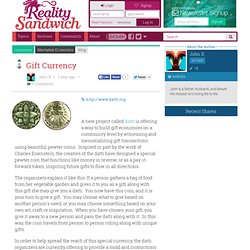
37 ways to join the Gift Economy. You don't have to participate in a local currency or service exchange to be part of the cooperative gift economy.
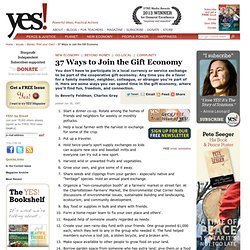
Any time you do a favor for a family member, neighbor, colleague, or stranger you're part of it. Here are some ways you can spend time in the gift economy, where you'll find fun, freedom, and connection. posted Jun 30, 1997. Future Positive » GIFTegrity. Giftegrity. GIFTegrity is a software that allows to organise the gift economy and non-reciprocal exchange, produced by Timothy Wilken and friends at Synearth.org.

Since it is somewhat complex to explain we start with a indirect citation, followed by the explanation by Dr. Wilken. All citations are from Synergic Economist Wayne F. Perg, Ph. “My concept and understanding of the GIFTegrity is one of a radical move away from trade-oriented or materialistic sort of exchange. Barter and monetary economies both tie together giving and receiving. To Build Community, an Economy of Gifts by Charles Eisenstein. For a multitude of reasons, we need to need each other. posted Dec 27, 2011.
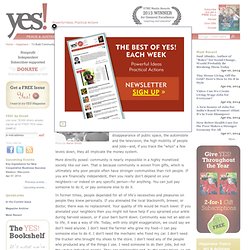
: freegan.info. Learn Skills, share tools, save money and make great new friends. Streetbank is very like Justfortheloveofit.
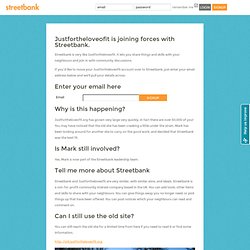
It lets you share things and skills with your neighbours and join in with community discussions. If you'd like to move your Justfortheloveofit account over to Streetbank, just enter your email address below and we'll pull your details across. Enter your email here. How do you get someone to lose interest in their hobby? Pay them to do it. I don't think this study goes far enough—-and drawing conclusions from partial information becomes misleading.
